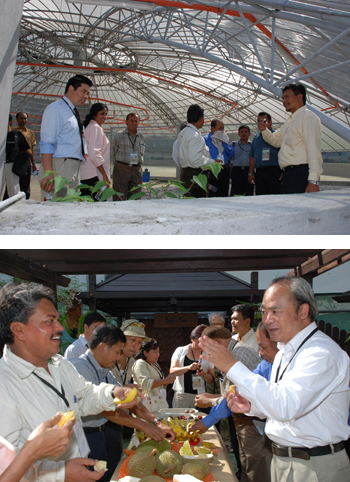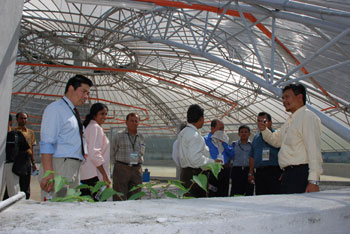View
| IAEA/RCA Project Planning Meeting Crop Quality and Sustainable Crop Production 25-29 June 2007, Kuala Lumpur, Malaysia | |||
|---|---|---|---|
|
Name
admin |
Date
2007.07.16 |
Views
4167 |
|


The objectives of this meeting are to develop and transfer methodologies and technologies for the induction and identification of mutated genes contributing to important crop quality characters and stress tolerance for sustainable crop producing, and to develop improved breeding material using molecular marker-assisted selection, through 1) development and establishment of efficient methodologies for the induction of mutants and the screening of crop germplasm with various and desirable quality characters, including nutrition and process characters and enhanced tolerance to stress, 2) development of molecular markers for tagging genes for quality characters and enhanced tolerance to stress in induced mutants, 3) use of molecular markers with the aim of developing improved crop varieties, and 4) development of improved germplasm with enhanced quality traits and improved resistance to stress.
In this regard, country reports on the current status on crop production, technology development and genetic improvement of relevant crops were presented in detail during the meeting. Relevant nuclear techniques are to be used to induce novel mutations for the improvement of targeted traits, e.g., tolerance to salinity and drought, improvement and diversification of quality and nutrition. New technologies, such as in vitro culture, new mutation techniques, molecular marker techniques, marker-assisted selection, TILLING, are to be used for various purposes for the RCA Member States.
Since crop germplasm is the key element and highly demanded for both breeding and genetic research, an agreement on the exchange of genetic materials for the implementation of this project was formed during the meeting. For the sustainability of project, it is requested that the establishment of a professional association of research scientists and educationists working in the field of plant mutagenesis be formed.
This project is meaningful especially in a sense that not only the farming community but also consumers will benefit from the development of stress tolerant lines with quality traits that will make a positive contribution to production, productivity and quality.
To this end, several important recommendations are made such as to the IAEA, 1) modification of the project structure, 2) extension of the project time frame to 2011, 3) facilitation of the Germplasm exchange as needed and appropriate, 4) assistance to the establishment of Asia and the Pacific association of plant mutation researchers, and to the Member States, 1) establishment of a research team in each Member States with the support from each government, 2) timely exchange of plant germplasm through policy framework supported by each government of the Member States.
For more information contact Mr. Chul-Whan Kang, Senior Researcher, Rural Development Association, Republic of Korea at [email protected].
Attachments



